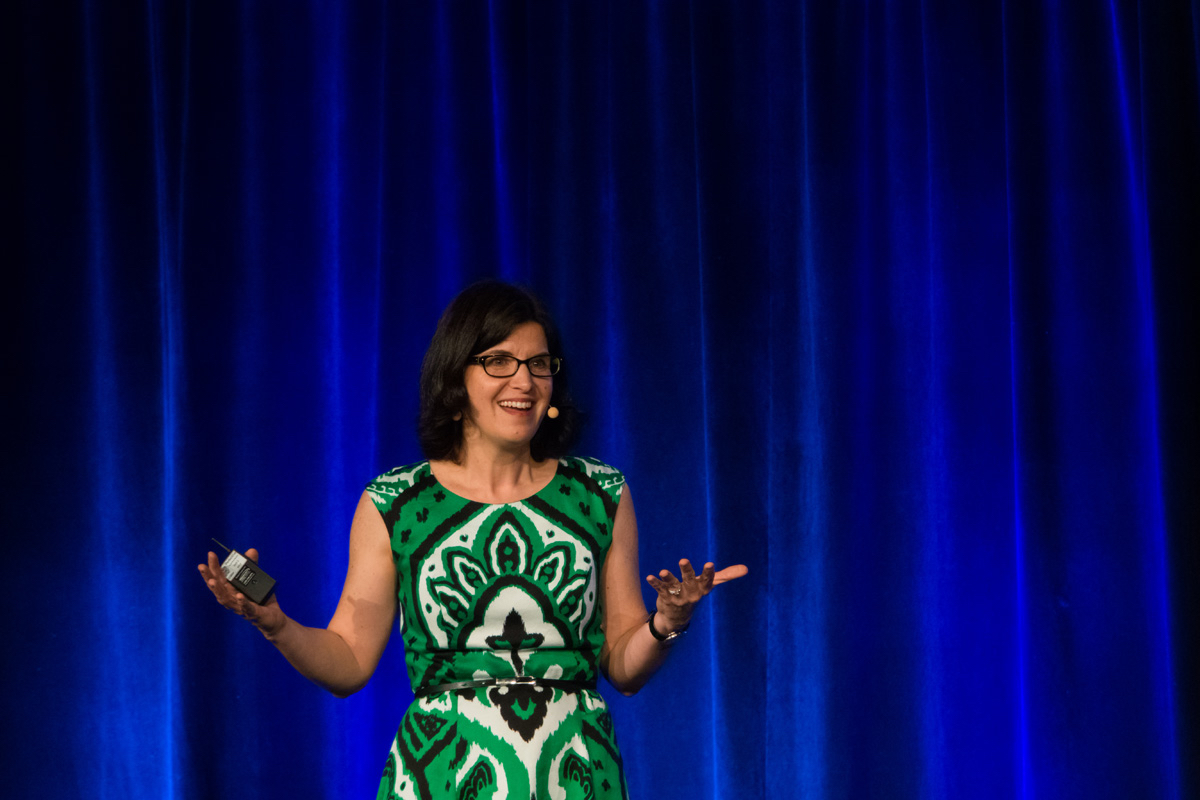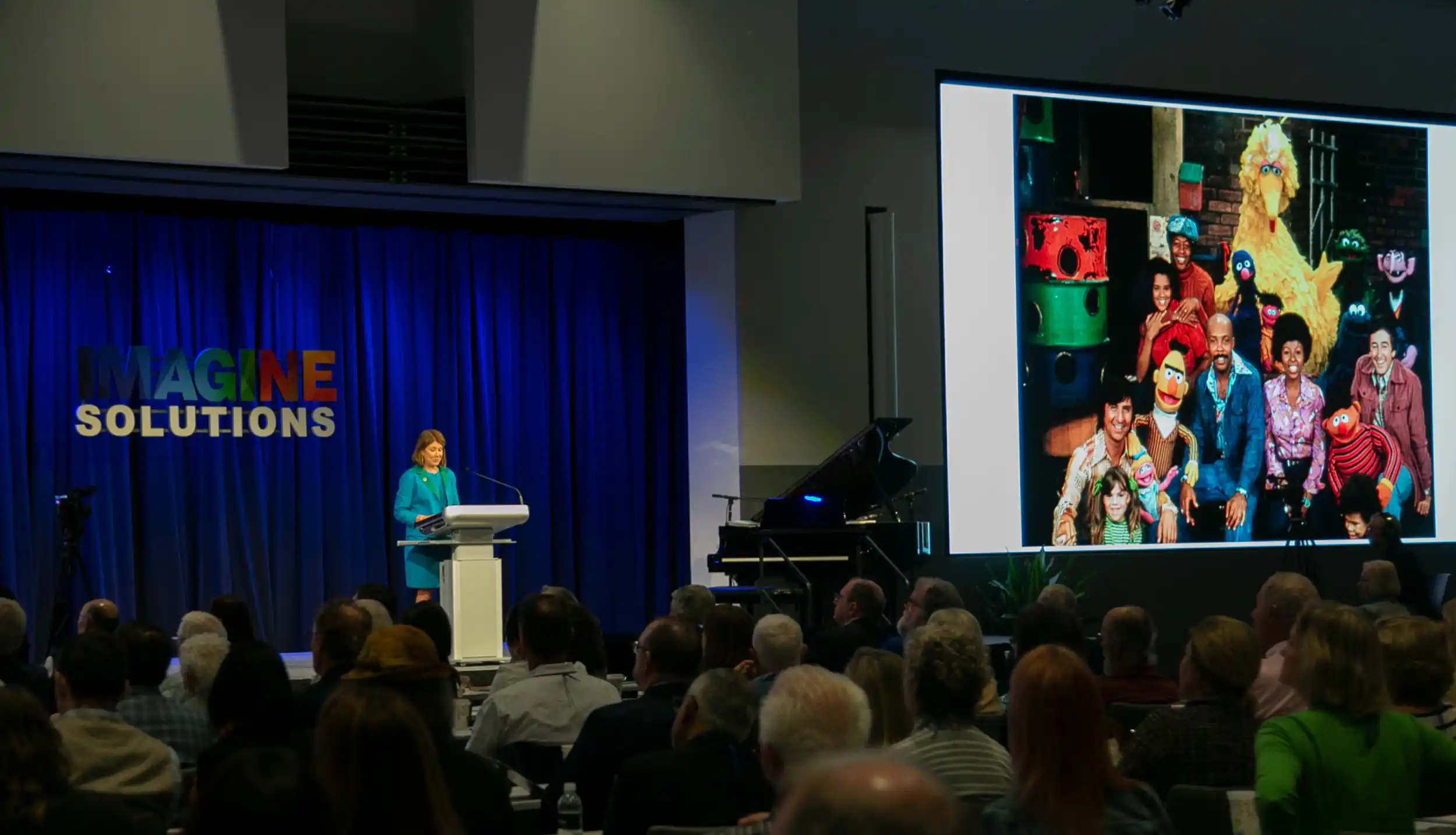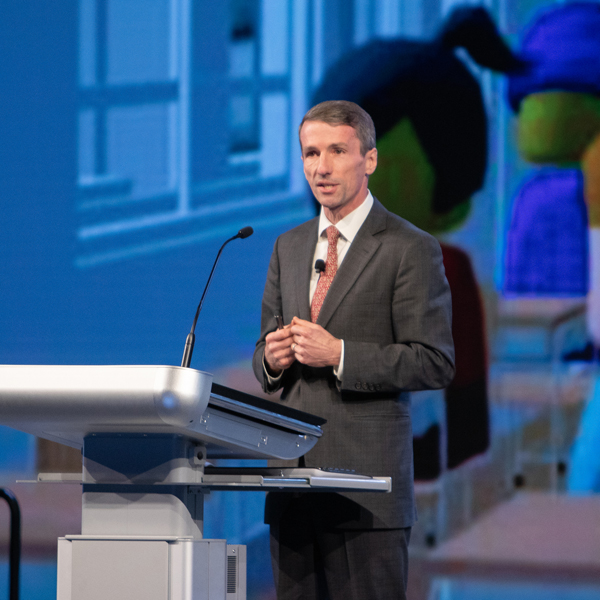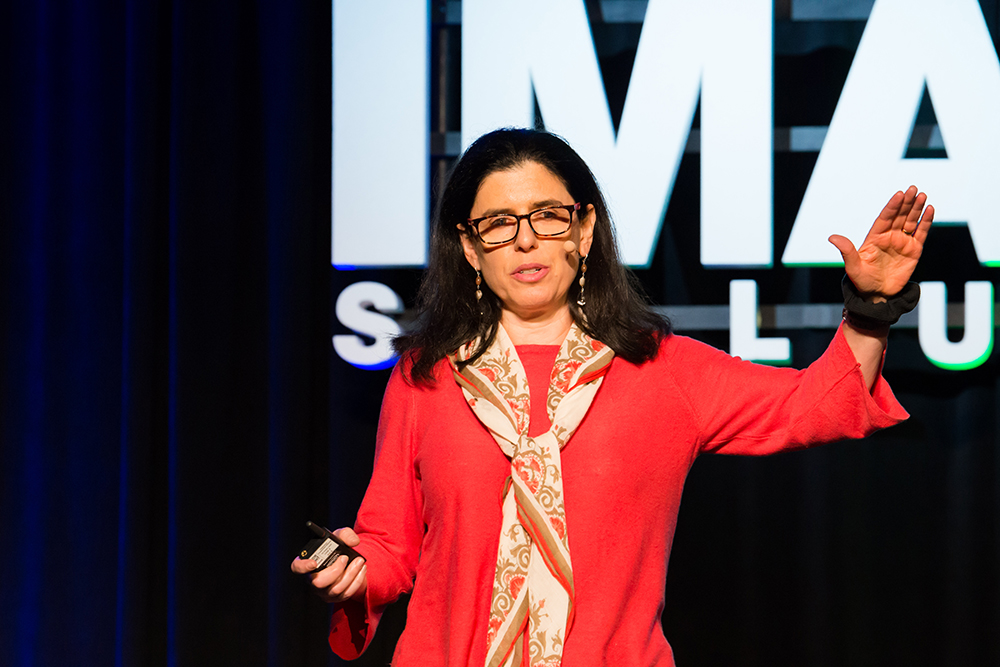Modeling Positive Technology for Our Kids
Sara DeWitt asks us to take a moment to consider digital technology in the context of kids. The debate rages about how much smart devices are negatively impacting children. How much screen time is okay? Sara thinks the better question is not about the time, but more so about the quality of the content. The content should be able to inspire curiosity and shape a positive worldview. Sara challenges us to look at digital technology as an opportunity to engage, much in the way Fred Rogers revolutionized children’s television. We can make these devices tools to help kids better understand the world, to play, to promote learning of all kinds, and even to interact and relate to others.
00.00
please welcome welcome Sarah do it [Music] so good afternoon I am so excited to be here and also I've already had so many conversations with you all about digital technology this seems to be a theme and imagined solutions today and I want us to take a little time to think about digital technology and kids really little kids so I know that we all believe that these are pretty central to our lives Deloitte says that we check our devices grown-ups check our devices at least 50 times a day and I'm sure you know that there is a furious debate raging right now about kids and these devices there's definitely is a lot of fear about are they making kids anti-social do these
01.00
devices drive obesity does it make kids just kind of do mindless activities for a long period of time and because of my background and what I do I have a child development background and because I work in media people often want to talk to me about this and the number one question I get from parents is how much screen time is okay for my kids they're looking for a magic number something that if you do less than their kids are gonna be ok we just need to not exceed this I think this is the wrong question we need to spend a little less time thinking about the time kids are spending and more time thinking about the content that's being developed for kids on these devices we've heard a few times today about the business models that have grown up around smart phones basically you're rewarded for how much time people spend with them your app is more popular and you can get more advertising dollars if people are
02.02
spending a lot of time and so that drives the content decision they want to do things they're gonna suck you in make you look at your phone for longer and longer periods of time unfortunately this is the same business model that trickles down into the development of kids content right now the way to be successful in the kids technology digital technology business is to make aim never quite end so the kids will want to keep playing and keep playing and keep playing and it doesn't have to be this way we really can think about this content differently and what I want us to do is to think a little bit about not only how the content can be different how it can inspire curiosity how it can encourage kids to go outside and play how can make them see the world around them and think about how other people feel we also want to think about the context in which kids are given these
03.00
devices and when they're using them what times make the most sense so let me tell you a little bit about myself I am kind of an unlikely champion for kids in screen time my focus and study was children and books I wanted to study kids in literature but as I got deeper into my Child Development Studies I kept getting more and more inspired by one of my heroes Fred Rogers it was 50 years ago and one week exactly that Mister Rogers neighborhood premiered on Public Television and Fred Rogers was starting his show in the middle of a very similar screen time debate it was the television that box in the living room that was the vast cultural wasteland it had the power to drive kids away from each other to isolate them from their life Fred Rogers
04.01
famously said that he wanted to try his hand at television because he didn't like what he saw on it he challenged us to look at it differently he wanted to look at television as a tool to support emotional development in children and so here's what he did he looked out from the screen and held a conversation as if he was speaking to each child in his or her living room he would ask questions and he would pause to give them time to think about it you can see his influence across all of kids television today and I would say you can also see his influence across grown-up television but at the time this was actually really revolutionary people weren't doing this kind of television and he changed the way we thought about it so today it's not just one box kids are actually surrounded by devices they're all around
05.03
them all the time and I think we have a chance now to look at them through the lens that Fred Rogers was looking through them to think about how can we create content on these devices how can we make these devices tools for kids that can help them better understand the world around them and there's some organizations that are doing some fantastic work for kids building really great content and Common Sense Media org is a great place to learn about a lot of this kind of work but I want to focus a little bit on the content that we're working on at PBS KIDS because I have been there for 19 years now actually today is my 19 year anniversary and we had the luxury to be able to be free from those business models that are driving constant engagement because of donations that people are making to local stations and from foundations who have come to support our work and it means that we've had the opportunity to
06.01
create some things that kind of can respond to what we're seeing happen in the commercial media world so I want to walk you through three different scenarios really common scenarios that I hear about from parents and grandparents and then show you some of the work in research we're doing to try to counter that so first up let's say that you're worried about how much screen time your kids are engaging in that you're worried that they're kind of becoming couch potatoes and they aren't getting up and moving in us so Chris Kratts and Martin Kratt are zoologist brothers and they do a show on PBS kids called wild kratts where they talk about animals and they wondered how we could use those cameras that are in all of our devices on our computers and in our and on our cellphones to actually help kids mimic very natural play patterns pretending to be animals so we started with bats and when kids came in to play this game they
07.02
loved it they loved pretending to be the animal and they liked being able to see the world from the animals perspective but my favorite part about this is that when we turned off the screen the kids kept being bats they kept flapping their wings around our research room they kept jumping back and forth to try to capture mosquitoes and it made us wonder what happens now when kids go outside do they look at a bird and wonder does that bird fly the same way that I was flying when I was a bat I'm sure that they were still being bats in the parking lots as they were parents were trying to get them into their cars but they were taking embodied learning out into the world and this gameplay this imaginative play was helping them keep their bodies moving so the next thing that I often hear is from folks who know that their kids are struggling with a different subject like something specific like
08.01
math math is the number one thing that comes up and they want to find a good way to work on math at home so video game developers know that you can actually learn a lot about the players skill by looking at the back end what's happening in the data so when does a player pause for a long time before they make a decision or when do they make a lot of wrong answers before they get to a right answer you can take this same data analysis to kids tablet games and to academic learning so a PBS station in Boston WGBH developed a series of games for Curious George that were focused on early preschool math skills and researchers brought in 80 kids and the had them do a standardized math test so we could see early on that the games these kids were playing we're helping them understand these key skills but a team at UCLA actually wanted us to go
09.01
deeper into the data and what they did is they built a neural net and what that means is they trained a computer to take the kids gameplay data and try to predict that child standardized math test score based on that data so here we have a subset of the children's math tests like these are the scores they had on the math tests and this is the computers prediction based on these children playing Curious George games for 20 minutes the accuracy is astonishing especially when you consider the fact that we didn't develop these games to be a test they were developed to be fun math games for a kid to play the researchers involved in this work feel like games like these could actually tell us more about a child's cognitive learning than a standardized test can so what could happen if a child could sit down and play games like these
10.01
with a character that they loved and a character that makes them feel comfortable how can that help them learn things how is this different than having to sit down and take a test and then what kind of insights can this data give to parents and to teachers so that they can better focus their time with kids to help them work on the skills that are the hardest so the third scenario is one that I think is probably the most common and that is you have a grown up in a household who desperately needs just 25 minutes to get something done and so they quickly hand a tablet to a three-year-old to keep them occupied now imagine this scenario let's say the parent is making dinner they've handed the tablet over they feel kind of guilty about that and then 20 minutes later the parent gets a text message that says Alex just matched five rhyming words ask
11.01
him if he can come up with another rhyme for the word ball or maybe cat so when we gave tips like these to parents they felt really excited and empowered they wanted to play these games over dinner and the kids loved it too because not only did it feel like magic if the grown-up in the house and knew what they had been playing little kids really loved to play games like these with grown-ups so that act of just talking to kids about the media that they're experiencing can be really powerful in 2016 Texas Tech University did a study with the show Daniel Tiger's neighborhood and they found that the show could actually promote empathy in children but there was a really important catch the gains were greatest if parents had to talk to the kids about the show they watched not just watching and not just talking was enough it was the combination that was
12.00
the key so as we think about these three examples we're thinking about things that aren't just our quick last-minute babysitting option of giving a kid a tablet and not we're not thinking about what content is on it this is all content that's being created to think about the context in which a child might be experiencing it content that is hoping that the child would then be inspired to go outside and play or context that the child is going to be practicing some key skills for school and now the parent will know which skills they need more help with or a context in which a child plays for a little while and then they have a conversation with their mom or dad I like to tell parents that this is a really interesting way to approach media to be planning it because we tend to just hand it to kids or put kids in
13.00
front of it but what have you tackled it like you do meal planning for the week when you do meal planning you have to think a little bit about okay what groceries do we have I need to do some planning so I know what to buy I need to do a little research so I know what recipes we're gonna do and I need to think about how much prep time I have each day if you approach screen time the same way you can think about okay what are the kinds of content that would make the most sense for my kid right now what are they really interested in so I can choose something that would get them more excited or what skills do I want them to be working on what time of day is gonna make the most sense to do this it just takes a little bit of upfront planning and I'll tell you it's not always easy I'm going to tell you a story about my own life just on Saturday the time when we most need screen time is when I am putting my younger child down for a nap my kindergartner will come in and interrupt me five times if I don't have him really carefully occupied
14.00
so lately he's been really interested in animals and in dinosaurs and looking at the different features so I chose a series of shows I recorded several for him and gave him the choice and when the show was over and I had already come out from my other son's bedroom I said okay it's time to turn it off and of course he said please can I just watch one more please please please and I said you know what I have a game over here that I really want to play with you I have some time to play with you right now and that actually got him to turn off the TV and walk over and we got to sit down together when we played this game where you do a build on drawing and we created a new species of dinosaur and he got to name it and we were drawing it together and we both were laughing and at the end of that he said mommy that was my favorite part of today and it was really my favorite part probably of the whole weekend I want to leave you with one
15.00
more thought and that is that kids learn by watching grown-ups mr. Rogers said this that play is the series of work of childhood so when you see a kid playing house when they're pretending to be a mom or a dad they're looking at the world around them and playing it because they're practicing for what the world is going to be like when they're older so what if children look around and they see grown-ups just like this all the time what does that say to them about the hold that this device has over our lives so we have a real opportunity to model good positive ways of using technology I am NOT an advocate for saying kids shouldn't have any tech at all I believe that we have the chance to show kids that this is a really important device for finding the way to that new park or
16.02
for having a real conversation with your grandmother or for doing a little bit of research and finding out what we're gonna make tonight for dinner and also this is something that after we've used it for a little while we turn it off and we put it away just like you would clean up the blocks and put them back in the corner it's an activity we do for a little while and then we engage in conversation with one another or we play a game together we have to look really hard at the way we're using these devices around kids and we have an opportunity to help them learn how to use them really wisely thank you [Applause]











